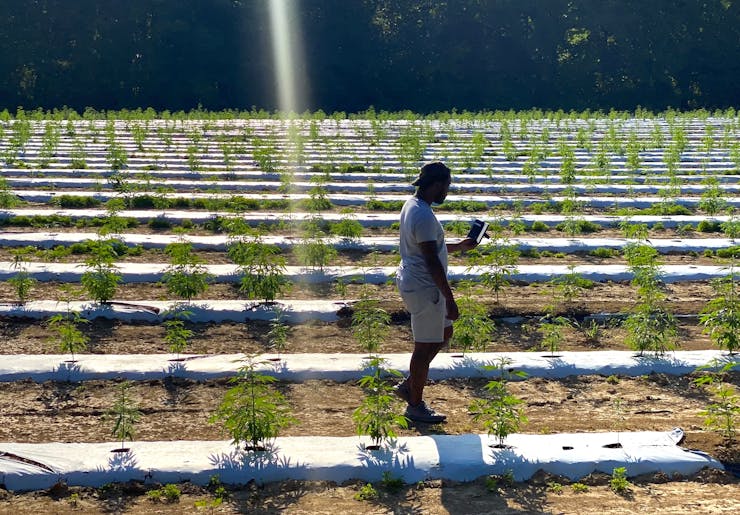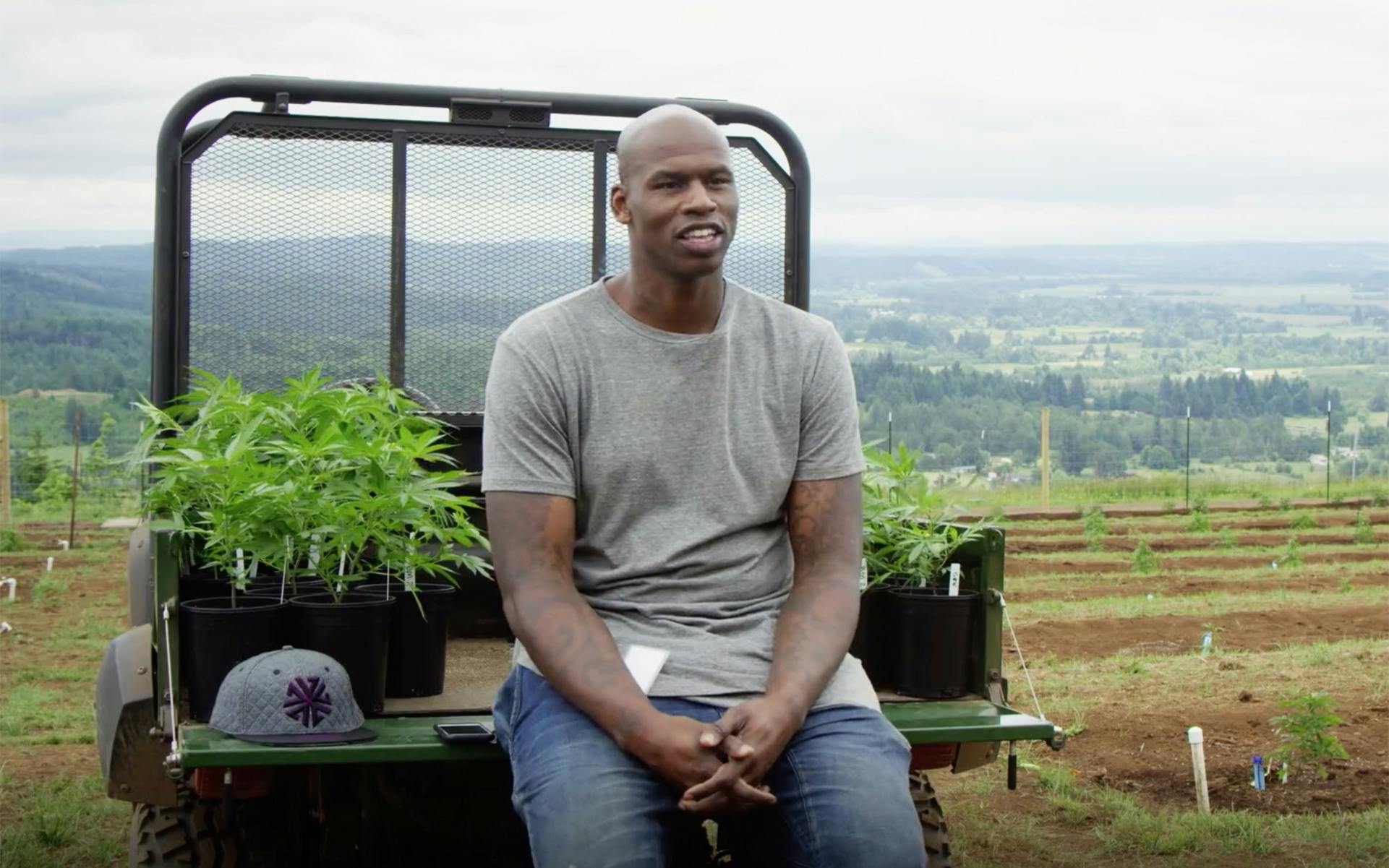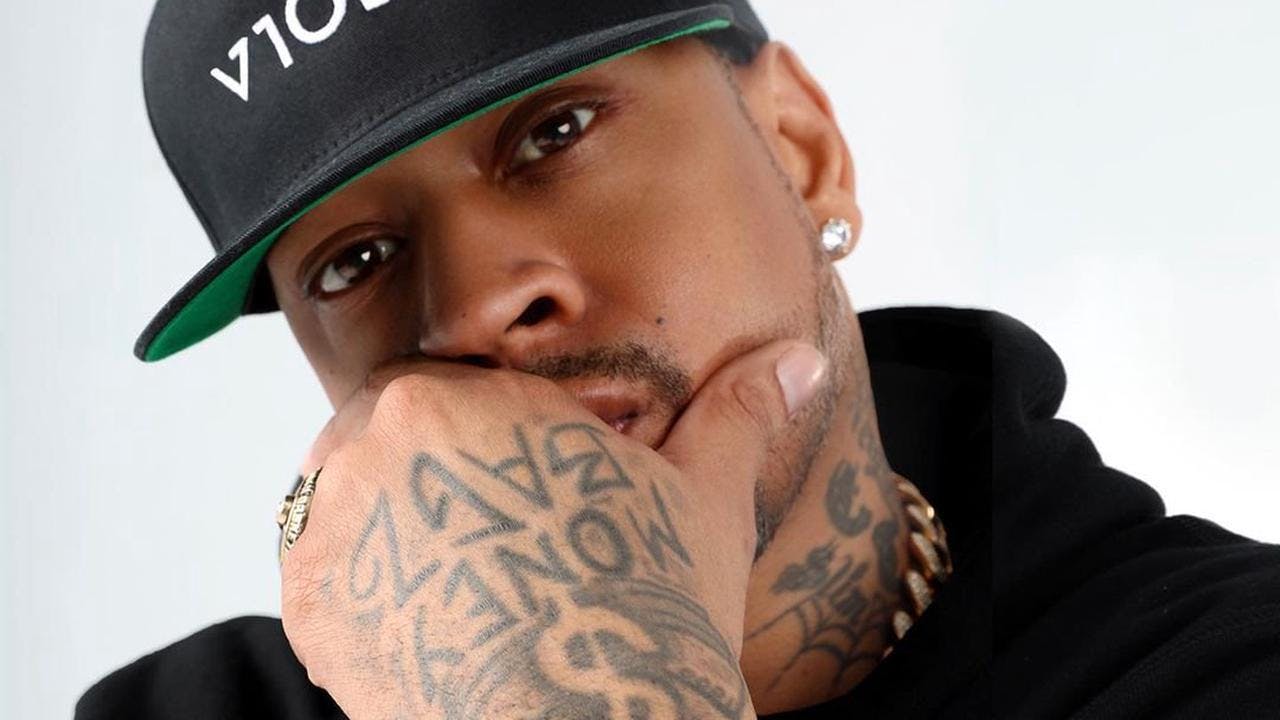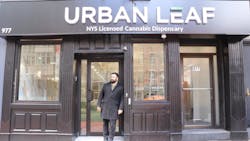Historically, Black families have been subject to a wide variety of strategies to weaken the bonds between them. From the transatlantic slave trade that brought Africans into the United States beginning in 1619 to over-policing that places Black people in prisons at five times the rate of white people, there have long been forces attempting to rip African-American families and our legacies apart at the seams.
One thing that these forces can never truly prosper against, however, is the spirit of Black ingenuity. Our determination to keep dreaming bigger and seize opportunities is something that runs as deeply in us as the legacies of our families themselves.
The Viola and Gold Standard Farms connection

In the cannabis industry, Al Harrington continues to build on his own impressive legacy as a businessman and the founder of Viola Brands – named lovingly after his grandmother.
Harrington hasn’t just built a cannabis brand. Instead, he has dreamed true an innovative reality that reinvents the way cannabis is owned and grown in the US – complete with its own social equity initiatives and mission is to increase minority participation and ownership in the cannabis industry while positively impacting communities most affected by the war on drugs.
In October 2020, the company’s commitment to its mission made another bold leap and started its Cannabis Incubator Program. The first business program selected for this program is Gold Standard Farms.
Located in Martin, Tennessee, and founded by CEO Jarrel Howard, Gold Standard Farms is a premium boutique hemp farm specializing in organic cultivation methods, seed genetic research, and the creation of eco-friendly hemp-based building materials. Gold Standard Farms was founded over 80 years ago by Jarrel’s great-grandparents, meaning that getting into the hemp business was a generational family affair.
Since partnering with the Viola Cannabis Incubator Program in 2020, Gold Standard has more than doubled its revenue in less than a year.
Leafly had the opportunity to speak with Al Harrington and Jarrel Howard in an exclusive interview where we discussed the importance of family, sustainability, and the significance of what they are doing as Black cannabis business leaders.
Listen to the audio for the full conversation or read below for excerpts from our conversation edited for clarity.
Al Harrington (00:40):
My name is Al Harrington, CEO and co-founder of Viola Brands, also, Harrington Wellness. Background, played in the NBA for 16 years, drafted out of high school in 1998.
I found my passion for cannabis pretty much in 2011 when I saw it helped my, at the time, 79-year-old grandmother deal with one of the ailments of a bunch of things she dealt with or deals with. But it was glaucoma. [I had her] try cannabis, and an hour and a half later, I go and check on her, and she’s down there reading her Bible.
So, it was the first time she was able to see the words in her Bible in over three years, and …As I continued to get deeper and deeper into the space, I realized that black people weren’t well-represented at all in the cannabis space.
AH (01:47):
So now, that’s pretty much what our company is about. We’re entrenched in purpose, and our purpose is to uplift, educate and empower people of color, participate in the cannabis space and just try to get us our rightful seat at the table as this industry continues to blow up.
Jarrel Howard (02:25):
I’m Jarrel Howard, CEO, and founder of Gold Standard Farms, and also, the Healthy Economic Momentum Push Campus, better known as HEMP Campus, located here in Martin, Tennessee, the Northwest Corner of Tennessee.
I come from a farm family. My great-grandfather founded our farm in 1941. It actually took him 10 years to pay $3,000 on it. He was well into his 50s when he moved his family here from Greenwood, Mississippi, and it’s been a staple in our community ever since.
So, we’re purpose-driven, based on trying to maximize hemp in its full potential, and most importantly, provide a better solution, whether that be to educate, incubate or accelerate farmers of color, predominantly black farmers, and help them advance and propel their dreams into reality through hemp cultivation and sustainable housing efforts.
When I got a chance to hear the story about the farm, was the first thing that really impressed me the most, because I had went to Jamaica maybe two or three years ago, and when I was in Jamaica, I was with some Rastafari, and they were telling me about how they own land there for like 200 years.
And I literally said to them, I was like, “I don’t think there’s nobody in America that has owned land for more than 20 years, black. And fast forward, three years later, I run into Jarrel and hear about his story, and hear that his family owned the farm for 80-plus years and the path in which they were able to own it, you know what I’m saying?
It wasn’t given to them, the pops, grand pops had to work to scrounge up $3,000, and it took him years to do it. That story just really just spoke volumes to me, because I’m just a firm believer, you have to have purpose in what you do. It has to come from somewhere. It has to be some form of passion.
– Al Harrington
Expanding on the legacy of a Black family farm

Jarrel Howard (06:36):
When I jumped into the space in 2018, when the farm bill was passed, my family wanted to make sure that if this was something that I wanted to do, I had the right mentor.
In our due diligence and research process, I had to sit in front of our board of directors, which are my aunts. They range between 58 years old to, at the time, 95 years old.
They’re more shrewd than any sharks that you may know, and they set me down and said, “Look, if you want to do this, you have to, A, use the entire farm, not just 10 acres” (which I had suggested at first for R&D) “And B, you have to be truly committed.”
They sat me down and said, “When we were younger, we worked this field with our hands and we’ve got a lot of blood, sweat, and tears in this. And we don’t want you to just think that because you’re in the family, that it’s your right.”
JH (07:32):
I had to present to them reasons why I felt that us switching from the traditional agriculture side of things into the hemp CBD space, would be beneficial. The potential chance for us to have a generational wealth system that could last another 80 years, and the most important thing, working with Al, who’s family-based. I showed them interviews of him speaking of his grandmother, Viola.
And you can imagine, ladies of the South saying, “Oh, I like that young man. You know what? Yes. We’ll do something if you get him involved.” So now I had to figure out how to get Al involved. I knew who I needed for a mentor, and that it was the only way that we were going to move forward.
JH (08:16):
My background is in sports management. I had actually written out in 2018, a web of athletes that played with Al throughout his 16-year career in which I knew. So I was reaching out to them saying, “Hey, can you introduce me to Al Harrington?” I was sending him messages on LinkedIn, and eventually I was like, “You know what? To get his attention, I’m just going to show him that we’re starting,” like, “Hey, Mr. Harrington, hope all is well. This is our seeds,” and, “Oh, hey. How you doing Mr. Harrington? I’m back, and now we’re doing our plant process.”
Eventually, about a year later, I got a response from Al and he was like, “Hey, I like what you guys are doing. Email this particular person,” and from there, I did a weekly check-in, and just showed him that, “Hey, we’re working. One of the biggest things that I need in this process now is a mentor. And, can you come down?” And he was gracious enough to come down to Martin, Tennessee.
We tested him. We didn’t tell him that our aunts were in our great-grandmother’s house watching as he came and I gave him the tour of the farm. Really, I was nervous that whole time, because they were sitting in the house and they were like, “Oh yeah, the deal’s not going to get done until we see that young man touch the soil.”
So, when he pulled up and we were actually able to give him the tour and we got the deal done right there at my grandmother’s house, it just meant a lot to me, my partners, and most importantly, my family, that we were going to be able to do something, not only for ourselves but for our community.
The Gold Standard Farms HEMP Campus
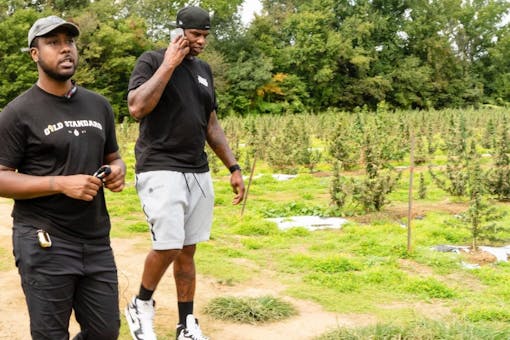
JH (10:38):
Through incubation at Viola, one of the things that Al is always asking us to do is find the problem so we can provide a solution. He’s allowed me to travel with him for the last year and a half and see that there’s a lack of representation.
We’re not necessarily represented the way that we should be in this space, and I think that that’s a problem that warrants a solution. So, we came up with the Healthy Economic Momentum Push, which is, HEMP, the HEMP Campus.
– Jarrel Howard
The HEMP Campus allows us to help black Americans educate themselves on the different things that they can do within the cannabis space. We’re also working with them to teach and certify them how to build with sustainable building materials. It is a play on Al’s Harrington Institute, where they’re able to obtain the educational component through the Harrington Institute, and also get the hours and the experience through the HEMP Campus.
Being there, learning how to cultivate, being there, learning how to process hemp into sustainable building materials, while also learning how to use those materials to create housing and other opportunities within Black America.
JH (12:01):
Historically, they say the 40 acres and a mule. So we want our 40 acres to actually work, not only for us, but for people of color, and to help them get to the next level. This is where we want to combat the lack of representation in the space, where they know that they have a home within the Harrington Institute, Viola, and also the Healthy Economic Momentum Push Campus, where they can learn and be able to advance and propel.
Everyone’s not going to be able to have a resource of friends and family that want to invest. And we don’t want people to be caught up with predatory lending, so giving them a home front is what my family wants to do. And this is our way of giving back, not only to the rural West Tennessee community but to the black community throughout the United States.
JH (13:37):
We’re actually finalizing the plan for a manufacturing site. I can actually speak about this now, so it’s kind of breaking news. We did a partnership with Hemp Block USA, where we’ll be the first manufacturing site in the United States to produce sustainable housing hemp blocks.
Something that Al has actually embedded in us throughout incubation is, don’t be an anchor, be a vessel.
– Jarrel Howard
That will be on our family farm as well as the Healthy Economic Momentum Push. So we’re super excited about being able to solve another problem within our space, which is, creating jobs and opportunities.
We don’t want to hold anyone back. We don’t want to hold them down. We want to help them safely navigate the waters and then allow them to do the same. Each one, reach one. So, with the combination of cultivation of 25,000 square feet and additional 21,000 square feet for sustainable building products, we look forward to being the number one African American hemp company in the next three to five years.
Growing the cannabis conversation in the American South

Jarrel Howard (23:54):
It was definitely something that I thought about when I started doing research. Like “Okay, we’re in a Bible belt that we don’t even… They don’t sell liquor in our county”. So let alone, here, I am a kid from the Eastside across the tracks that… He doesn’t just want to do one head plant. He wants to do 19,000 of them. So, that was something that I thought about, my family thought about, but ultimately, the community started to embrace it. Black, white, brown. Because what I wanted to do was bring opportunities.
It’s a 27% poverty rate here, four and a half percent unemployment. So, understanding where the world was going, Mississippi, going legal, it started to make things more acceptable here in Tennessee, or where I’m located, in Martin, Tennessee, the Northwest corner.
JH (24:48):
And, people have embraced it. I’m known around town as the hemp farmer, which is fine, cause my family’s been farming for 80 years. So to be able to create my own lane and have the community reach out and say, “Hey, when you guys open up and do this and do that, I want to be a part of it”, no matter what their color is. We see that there’s some progression, but we also know that, in the hills and in the closets, there’s going to be hate.
Our biggest thing is just to focus on our focus, to continuously create opportunities and get better, and as time skills, hopefully, we’re not going to have to go through the same things that my grandmother and great-grandmother went through and we can be the pioneers and the front runners here within the state of Tennessee, helping with legalization and many more things to come.
– Jarrel Howard
Al Harrington (27:47):
When I just think about the South and just the country in general, where we are with trailblazing and making stuff happen. We’re lobbying, we’re talking to lawmakers, regulators, legislators, trying to continue to keep them up to speed on what’s really going on and what’s really important to the industry.
I think, a lot of the lawmakers that are making these laws and stuff don’t really understand the magnitude of the taxes that they may implement or the rules around not being able to have access to certain things in your product and stuff like that. They don’t really understand it. So, I think they have to keep that door open to continue to talk to the people that have been doing this, and they’re making these sacrifices, even from the black market to the legal market, because their perspective is unique and they know what they’re talking about because they have this experience.
So, that’s where we have to go in order for this thing to really take off and have the success that I think we are, ultimately, in it for.
